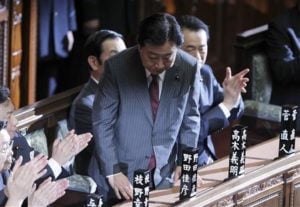
In her most recent post at CFR’s Asia Unbound, Elizabeth Economy lays out the range of Chinese reactions to PM Noda’s election, which has spanned, in her words, “from the bleak to the belligerent.” She writes,
“Chinese analysts point out that the prime minister has not renounced his comments to the effect that Class-A Japanese wartime leaders should no longer be considered criminals nor has he committed not to visit the Yasukuni Shrine. He also has made reference to China’s rising nationalism and naval activities as posing a risk to regional stability. To top it all off, the new prime minister has been a strong supporter of the U.S.-Japan defense alliance.”
Her assessment is worth a read, if for no other reason than its consolidation of Chinese commentary on the election.
I would simply like to add to this that a very similar account could be written regarding South Korean reactions to the election. While Lee Myung-Bak, like Wen Jiabao, was quick to offer his congratulations, the South Korean Foreign Ministry, and a number of high ranking diplomats, were hard at work to express their reservations over Noda’s historical insensitivity.
“We expect to continue to forge mature and future-oriented relationships with the new Japanese government led by Prime Minister Noda as it looks squarely at its past,” said Seoul foreign ministry spokesman Cho Byung-Jae at a recent press conference. This coming just a week after the same ministry noted that Mr. Noda’s previous historical comments were “inappropriate remarks that deny Japan’s imperialist invasive past and fail to conform with the Japanese government’s official position.”
The Korean press has been predictably less restrained. The Chosun Ilbo, for example, recently editorialized that: “Noda has a far-right and militaristic view of history. He says there are no war criminals in Japan in the first place. It is very likely he will pay a visit to worship at Yasukuni Shrine.”
It remains to be seen what will actually come of this. There is a distinct possibility that, as the reality and gravity of his responsibilities as PM sink in, Mr. Noda will bury these historical issues, much as his DPJ predecessors did. Anything but that, however, and East Asian diplomacy will become messy business indeed.